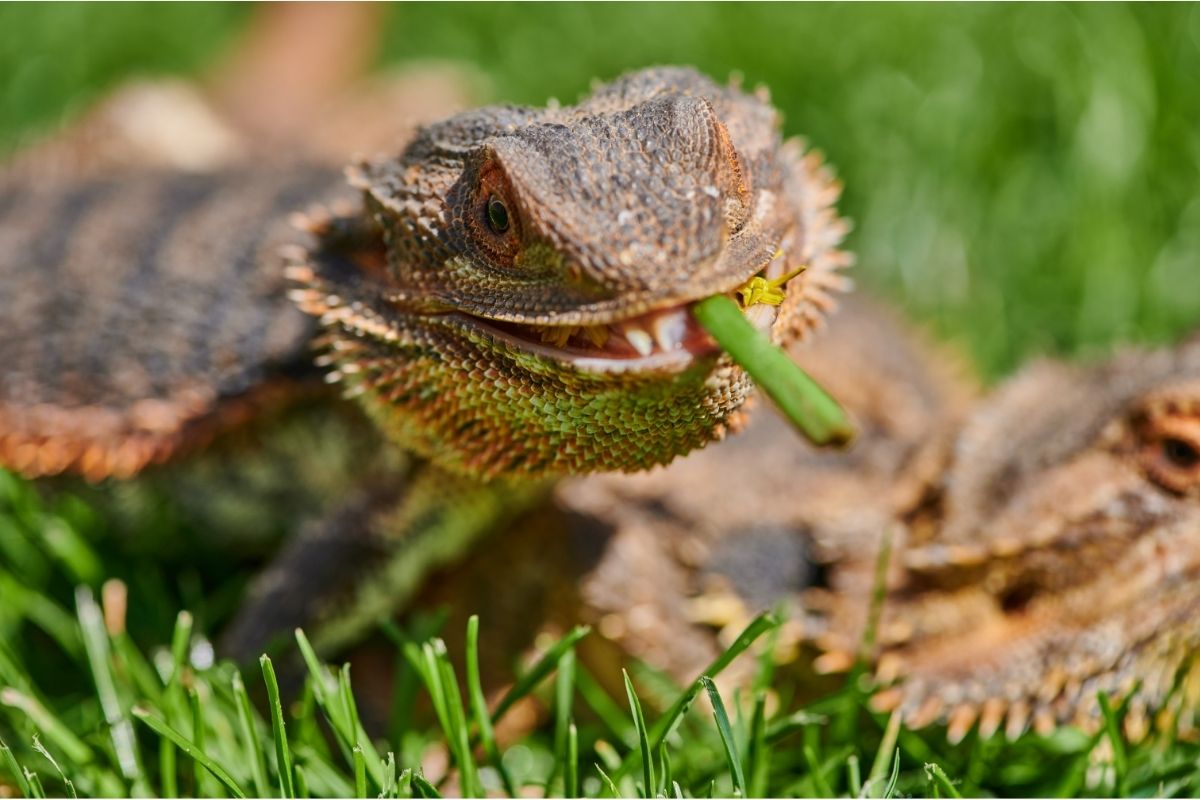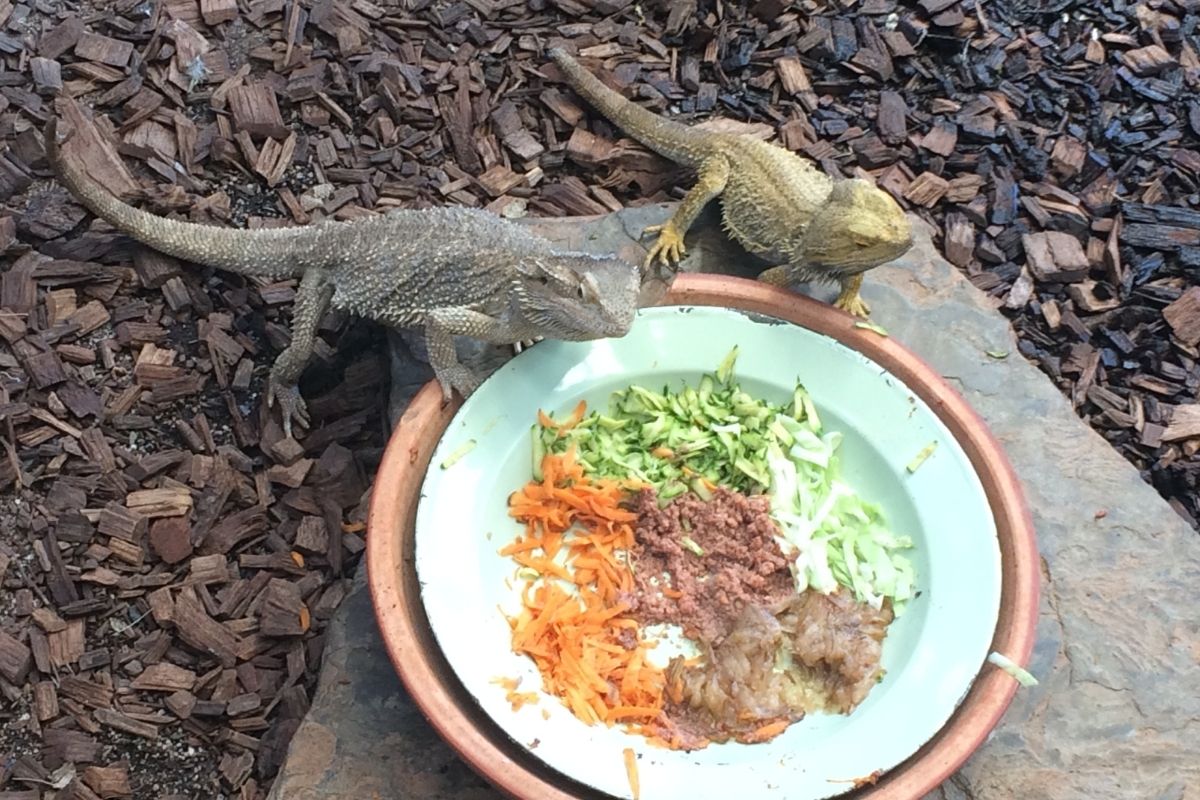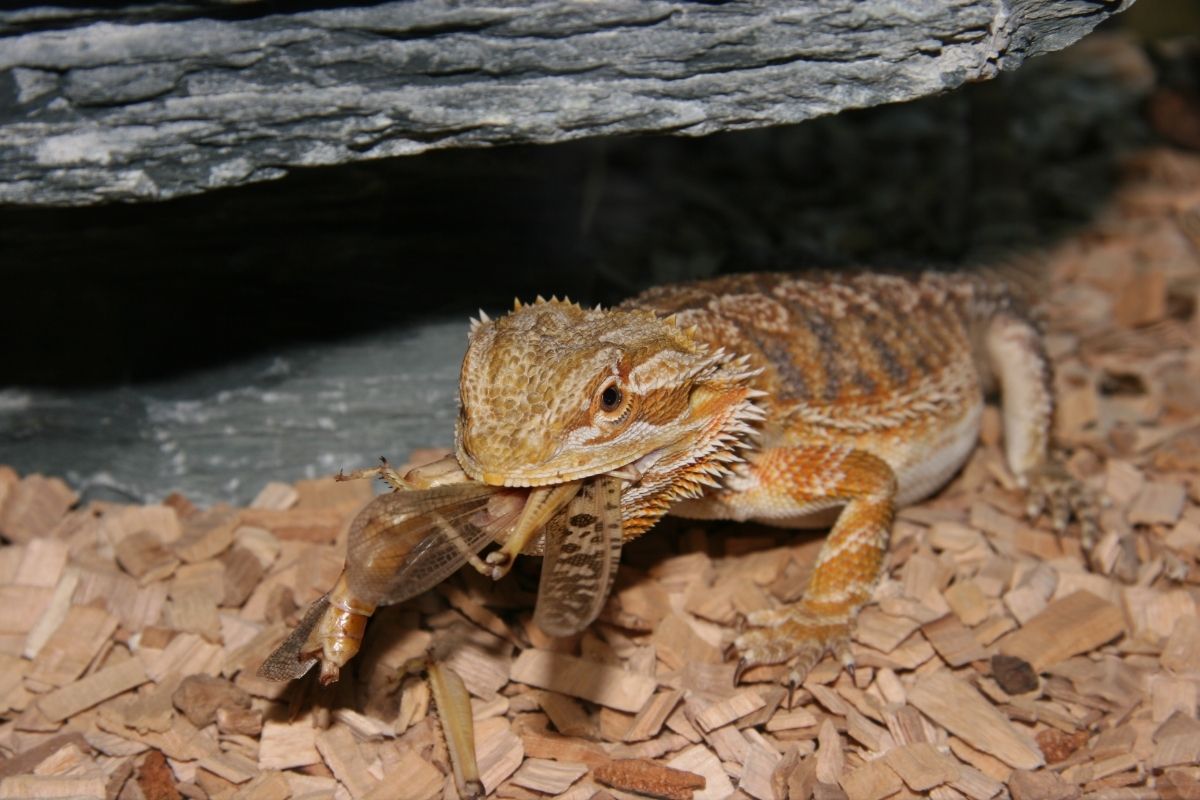Bearded dragons are reptiles native to Australia.
They are known for their long snouts and large heads.
Their diet consists mainly of insects, fruits, and vegetables.

Kale is one of the most talked-about foods that has come out of the nutrition world.
Alongside spinach, berries, and broccoli, it’s now considered a superfood that comes with a plethora of health benefits.
We know as humans that having these superfoods in our diet is going to be beneficial to our long-term health, but what about the animals of the world?
Many pet owners have the continued concern that they are not providing their pets with the best nutrition possible.
This is understandable, as you feel responsible for their well-being, like a child you are nurturing.
Today we are going to explore kale and how it can play an important role in the diet of your Bearded Dragon.
We’ll explore the health benefits of kale and whether any other similar foods would be a good accompaniment.
What Is Kale And What Nutrients Does It Contain?
Kale is a leafy green vegetable that has become very popular over the last decade.
It’s high in fiber, vitamins, minerals, and antioxidants.
Kale is also rich in calcium, iron, magnesium, potassium, and also vitamin C.
Kale is a nutritious food that contains many health benefits.
It’s low in calories, cholesterol, sodium, and fat.
It’s also packed with nutrients such as vitamin K, folate, manganese, copper, and vitamin B6.
How Can Kale Benefit Your Bearded Dragon?
Bearded dragons are omnivorous creatures, meaning that they eat both plants and meat.
However, they do not consume red meat or poultry on a regular basis.
Instead, they prefer to eat insects, fruit, and vegetables.
The reason why they don’t eat meat is that they have small teeth that aren’t large enough to tear through meat.
Bearded dragons use their tongue to grab and eat their prey.
They will often feed on grasshoppers, crickets, mealworms, and even flies.
As mentioned earlier, kale is a great source of nutrients that are essential for your bearded dragon’s overall health.
Here are some of the top reasons why you should add kale to your bearded dragon’s diet:
Kale Is Rich In Vitamin A
Vitamin A is necessary for healthy skin, eyes, bones, and the immune system.
It helps regulate growth and development.
Kale Is High In Vitamin C
This nutrient is vital for proper bone formation, wound healing, and cartilage maintenance.
Kale Is High In Fiber
Fiber aids digestion and promotes bowel movements.
Fiber also helps prevent constipation.
Kale Has A High Antioxidant Content
Antioxidants help fight free radicals, which cause cell damage.
Free radicals are produced by toxins, pollution, stress, and poor diets.
Kale Is High In Protein Content
It provides your bearded dragon with many of the amino acids needed for proper muscle building and repair.
Kale Is High In Calcium Content
Calcium is important for strong bones, healthy teeth, and normal heart function.
Kale Is High In Iron Content
Iron is vital for blood production, energy metabolism, and oxygen transport.
Iron deficiency can lead to anemia.
Kale Is High In Zinc
Zinc is required for brain and nerve functions, cellular reproduction, and wound healing.
Kale Is High In Iodine Content
Iodine is important for thyroid gland functioning.
Does Kale Actually Contain High Levels Of Oxalates?
Oxalates are naturally occurring compounds found in many fruits and vegetables.
They are part of the plant’s defense mechanism against pests.
However, when oxalates accumulate in excess amounts, they can cause problems.
For example, excessive intake of oxalates can result in the malabsorption of calcium, which is vital for the long-term health of your bearded dragon.
In addition, excessive oxalates can be toxic to reptiles.
In fact, it was reported that one lizard died after eating too many rhubarb leaves.
So, where’s the line here?
Is too much kale going to cause problems for your reptile?
What Are Kale Oxalates Per 100 Grams?
According to the USDA National Nutrient Database, kale contains 20 mg/100 g of oxalate.
That means that if your bearded dragon eats 1 cup of kale, he’ll get about 2 mg of oxalates.
You’ll be relieved to hear that this is one of the lowest levels of oxalate per 100 grams that will feature in a bearded dragon’s diet.
Now, if we compare this to spinach, this contains 656 mg/100 g of oxalate, which is well over 60 times the levels of kale.
Kale And Calcium Levels
At over 250 mg per 100 grams, calcium is found in abundance in kale and is one of the best sources for your bearded dragon.
The recommended daily amount of calcium for reptiles is between 5 – 10% of their body weight.
So if your bearded dragon weighs 3 pounds, then his daily requirement would be around 150 – 300 mg of calcium.
How Does Kale Help With Bone Health?

As mentioned above, kale is rich in vitamin K2, which is essential for proper bone development.
Vitamin K2 is also known as menaquinone or MK-4.
It has been shown to increase bone density, and fun fact: it can reduce fractures in humans.
Is Kale Low In Sugar?
One of the biggest misconceptions about kale is that it’s high in sugar.
The misconception comes from the fact that all carbohydrates are sugars at the molecular level and, when broken down, will be digested as glucose.
This is true but is far from the whole picture.
Carbohydrates have two main components: starch and fiber.
Starch is made up of chains of glucose molecules linked together by bonds called glycosidic bonds.
Fiber is not digestible, so it passes through our system without being absorbed.
When you eat foods like broccoli, carrots, beans, peas, lentils, and other veggies, you’re actually getting more than just carbs.
You’re also getting vitamins, minerals, antioxidants, phytonutrients, and fiber.
So what does this mean for your bearded dragon?
Well, while some people may think that kale is “high” on the glycemic index scale, it isn’t.
Glycemic Index is a ranking system used to determine how quickly a carbohydrate raises blood sugar.
It measures how fast food causes your blood sugar to rise.
Foods with a low GI score raise blood sugar slowly, whereas those with a higher score raise blood sugar faster.
However, there are no studies that show any link between GI scores and health benefits.
In fact, most vegetables fall into the medium GI category.
There are, however, some exceptions.
For example, potatoes have a very high GI rating because they contain large amounts of starch.
But since they are starchy, they don’t cause spikes in blood sugar.
Overall, kale is not going to because of any issues such as tooth decay, obesity, and other health issues associated with sugar.
Kale is low in kale and is considered safe to consume.
But you still want to adhere to the principle of moderation.
That means making sure they don’t eat a lot of fruit, for example.
Kale And Vitamin A
Kale is an excellent source of vitamin A, which is important for healthy skin and eyes.
This nutrient is especially beneficial for reptiles who spend much of their time basking in the sunlight.
Vitamin A helps protect against sunburns and skin cancer.
The best way to get enough vitamin A is to feed them fresh fruits and vegetables.
What Other Reasons Make Kale A Healthy Option?
As we’ve already discussed, kale is also an excellent source of iron, magnesium, manganese, potassium, phosphorus, protein, riboflavin, thiamine, zinc, and vitamin C.
These nutrients help support normal growth and development, immune function, energy production, metabolism, and many other functions.
Should Bearded Dragons Eat Kale Every Day?
If you’re looking for a diet that includes kale, then yes!
It’s a great option.
Just make sure to keep it balanced and moderate.
You can easily add kale to your bearded dragons’ diets by mixing it into their meals or adding it to their daily treats.
You can also sprinkle it onto their substrate.
Be aware, though, if you do give them kale, you’ll need to monitor its consumption carefully.
Because kale has a relatively high water content, it can be difficult to measure exactly how much your bearded dragon eats.
And when it comes to kale, there’s one thing that should always be kept in mind.
While kale is generally considered safe for bearded dragons, it can sometimes cause gastrointestinal upset in certain individuals.
So if you notice anything unusual about your bearded dragon’s behavior after eating kale, then stop feeding it immediately.
How Much Should I Feed My Bearded Dragon Each Week?
To ensure that your bearded dragon gets all the vitamins he needs, you’ll want to provide him with at least 2 cups of greens per week.
That’s roughly half of what they would normally eat.
Keep in mind that this amount will vary depending on the size of your bearded dragon.
For example, if you have a small bearded dragon, then you may only need 1 cup of greens per week.
If you have a larger bearded dragon, then you’ll probably require more than that.
It’s also worth noting that you can mix different types of greens to create a variety of flavors.
Just remember that you shouldn’t overfeed your bearded dragon.
You don’t want to end up causing problems like obesity.
Do Bearded Dragons Need To Have Their Food Pre-Treated?
Yes! Because of the bacteria that live naturally on plants, some foods are pre-treated before being fed to reptiles.
When it comes to bearded dragons, this process usually involves soaking the food in hot water.
When animals eat raw foods, they often ingest harmful microbes that can cause serious health issues.
These include salmonella, listeria, E. coli, and campylobacter.
So, by treating your bearded dragon’s food with heat, you can eliminate these risks.
This process also makes it easier to digest the food.
What’s The Best Way To Prepare Kale For My Bearded Dragon?
Like all greens, you can prepare kale just like you would spinach.
Just rinse off any dirt or debris from the leaves before using them.
Then chop up the leaves and place them in a bowl with some water.
Let the leaves soak for 15 minutes.
After this time, drain the leaves and repeat the process until the water runs clear.
After draining the kale, dry it thoroughly with paper towels.
Bearded Dragon Diet: What Are Some Foods That Bearded Dragons Like To Eat?

Bearded dragon food is made up of a variety of foods that can be found in the wild or purchased from pet stores.
The best way to feed your bearded dragon is by using a commercial reptile diet.
Commercial diets have been specially formulated to meet the nutritional needs of reptiles.
Some of the most common foods fed to bearded dragons include:
- Grasshoppers
- Crickets
- Mealworms
- Worms
- Fish
- Insect larvae
- Fruit flies
- Honeydew melons
- Apple cores
- Corn
- Peanut butter
- Avocados
- Nuts
- Apples
- Pears
- Ban
Is There Any Benefit To Feeding Your Lizard A Balanced Diet?
Yes! By feeding your bearded dragon a balanced diet, you’re giving him all the nutrients they need to stay healthy.
A balanced diet includes protein, carbohydrates, vitamins, minerals, fats, fiber, water, and other necessary nutrients.
If you only provide your bearded dragon with fruit, nuts, apples, and veggies, he won’t receive any protein, carbs, fat, fiber, or water.
This is why it’s important to give your bearded dragon a complete meal every day.
And whilst we’re on the topic…
Does My Beardie Need More Protein?
Your bearded dragon may need more protein than what is provided in a typical commercial diet.
Protein is an essential nutrient that helps build muscles and bones.
Reptiles are omnivores, meaning that they eat meat and plant-based foods.
If you’re looking to supplement your bearded dragon’s diet with extra protein, you should look at adding some chicken, fish, beef, or even duck to their meals.
Final Thoughts
Kale is certainly one of the most nutritious foods for humans, and it’s the same for the bearded dragon.
As long as you keep your bearded dragon safe, happy, and well-fed, you’ll be providing them with everything they need to thrive.
Frequently Asked Questions
How Much Food Do I Give My Bearded Dragon Every Day?
The amount of food needed varies depending on the size of your lizard.
Generally speaking, small bearded dragons require about 1/4 cup of food per week.
Larger bearded dragons will need more.
You can find out how much food your bearded dragon requires by measuring his body weight.
Once you know how much food your bearded needs, you can use our handy dandy calculator to figure out how many calories you should be feeding him each day.
What Should I Use For Water?
You should always use fresh water when feeding your bearded dragon.
Never let the water sit around too long because bacteria could grow in the stagnant water.
Also, make sure that you don’t put anything into the water that might harm your lizard.
You should never add chemicals like bleach, ammonia, or detergents to the water to avoid any health issues.
